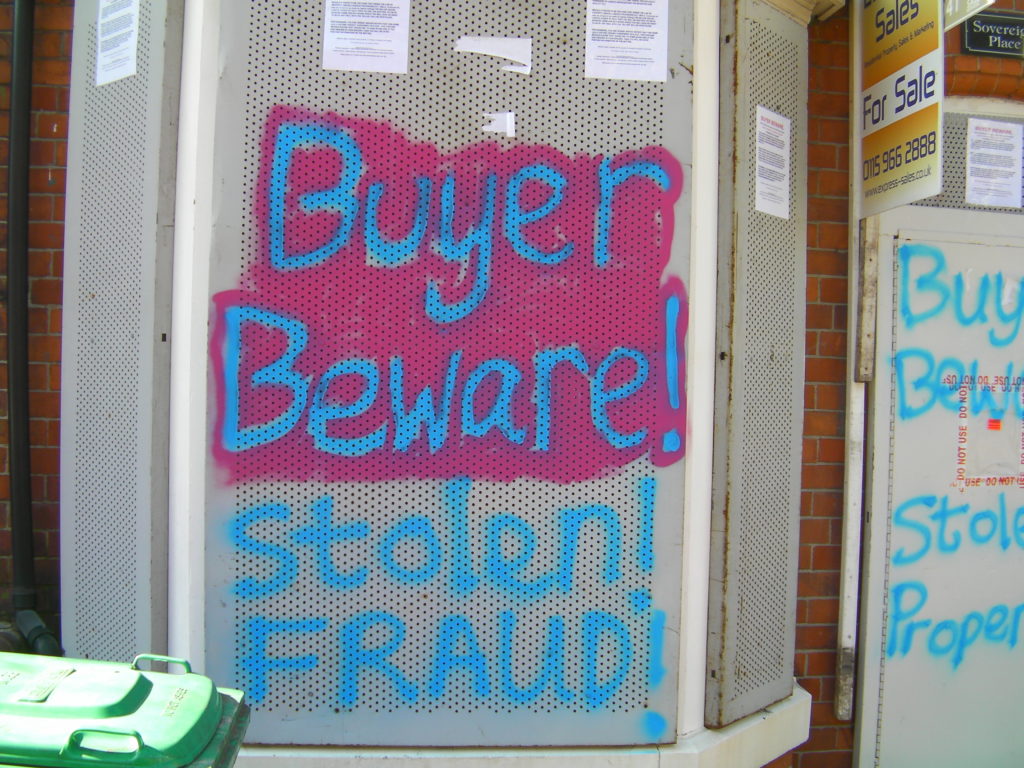
In an unprecedented development, the trustees of my family’s private property trust have received notification from Durham Land Registry, that their legal objection to the LPA Receivers’ attempt to transfer ownership of one of the trust’s properties to a third party prospective buyer has been accepted by the Objections Officer, who wrote that, in her view, the trustees have shown:
…arguable grounds for objection to the application.
Those grounds can be summarised thus:
- In the absence of a stand-alone Powers of Attorney Deed, which must be executed by the trustees in accordance with the Powers of Attorney Act 1971, Bank of Scotland’s Powers of Attorney clause in its Standard Mortgage Conditions is legally unenforceable;
- the bank, therefore, does not possess the right to appoint the LPA Receivers to act in the names of the trustees; and
- the receivers’ application to transfer ownership to the prospective buyer is illegal, void and fraudulent, as per one of the points taken by HHJ Behrens in our own case, Bank of Scotland plc v Waugh & Others [2014].
The Land Registry has directed that, unless a private settlement is reached between the parties by the 10th of June, the matter will be transferred to the Property Chamber, which will be asked by the LR to rule that our objection has sustainable grounds and the receivers’ application is therefore fraudulent in nature, as are their purported LPA Receiverships over the property.
Followers of the long-running dispute will know that the last time one of our applications was passed to the Property Chamber, the tribunal ruled that our section 1(3) argument had been proven in the High Court and the first void mortgage against the property concerned was canceled as “mistake” in the Charges Register. However, the prospective purchaser in this instance will now almost certainly withdraw from the illegal disposition, blaming the receivers’ solicitors for falsely assuring them that their clients were acting lawfully and the trustees’ objection will be upheld without the involvement of the Property Chamber.
This naturally means that we have finally won another legal argument we have been positing for the best part of the last six years – the receivers have been illegally appointed to manage the trust’s properties – nine of which have been fraudulently sold at a fraction of their true market value and registered as having new owners by the Land Registry, despite vigorous legal objections being lodged by the trustees in advance of registration on every occasion.
Nevertheless, the Land Registry officers have taken their current, somewhat revised, position, having rejected our previous objections as “groundless”, knowing that in the event our objection is upheld, every illegal entry in the Charges Register made by the receivers in the names of the trustees since July 2010, must be removed as fraudulent on the same grounds. The Land Registry is bound to indemnify the trustees for all the losses incurred as a direct result of these false entries in the register.
In addition, since the trustees have already produced the sworn evidence requisitioned by the Assistant Land Registrar, proving that none of the mortgages purportedly held by the bank were validly witnessed, thereby rendering the instruments void at law under section 52(1) of the Law of Property Act 1925, for failing to comply with section 1(3) of the Law of Property (Miscellaneous Provisions) Act 1989; the Land Registry must retrospectively cancel each mortgage as illegal and void by renewing the trustees’ AP1 applications that were made for those specific purposes in February and March 2013, before any of the trust’s properties had been illegally conveyed by the receivers.
As if this perilous situation is not bad enough for the Land Registry and the conveyancing industry in general, the stinking elephant, sitting in the corner of the room on an ever-growing pile of shite, can no longer be ignored:
Under which purported legal authority does a conveyancing solicitor advise a mortgagor to sign a mortgage deed, but leave the space for its date blank, so that said solicitor, under the instructions of the mortgagee, can add it at a subsequent time and place?
Well it certainly isn’t under section 1(3) of the 1989 Act, since that requires that a deed is complete at the moment of execution, as per R [Mercury Tax Group] v HMRC [2008]. This requirement is also plainly stated in section 5.18 of the Council of Mortgage Lender’s Handbook:
The mortgage deed must not be amended.
Section 6.1 goes on to state that:
The loan to the borrower will not be made until all relevant conditions of the mortgage offer which need to be satisfied before completion have been complied with and we have received your certificate of title.
Rather paradoxically, given that all UK mortgagors have been required for decades, as a mandatory condition of receiving ‘a loan of monies’, to sign mortgage deeds to properties they do not yet own before any credit is advanced; in section 11.2.1 the Handbook states in partial accordance with section 1(3) of the 1989 Act:
The witness’s signature must clearly record the witnessing of the signing of the document by the individual concerned, and the name and address of the witness must appear in legible form. All documents required at completion must be dated with the date of completion of the loan.
In other words, the CML is advising lenders to collect all of the mortgage documents before the “completion of the loan”, which necessarily requires the mortgagor to illegally grant a legal mortgage over a property which they have not yet completed the purchase of, as per Scott v Southern Pacific Mortgages [2014] – a mortgagor has no rights to grant before the completion of the sale and purchase of the property concerned; hence the instruction that the deed must bear the same date as the transfer of credit to the mortgagor, in order to give the false impression that section 1(3) of the 1989 Act has been complied with.
Therefore, on the balance of probabilities, despite complete ignorance of the fact by almost the entire conveyancing industry, the mortgagee can only be purporting to have appointed the solicitor to act in the mortgagor’s name, under the unenforceable Powers of Attorney clause in the Standard Mortgage Conditions [see section 15], to illegally amend the mortgage deed by adding the date at a moment subsequent to its signature by the mortgagor.
All of which reminds me of a truly memorable conversation I had in February 2010 with a conveyancing solicitor of more than three decades professional experience, during which I explained to him that there was no other logical explanation for the common practice of his industry, to which he ominously replied:
Michael, if what you’re saying it true…and I’m not saying that it is…but if it does turn out to be the case that you’re right, it will bring down the whole conveyancing industry.
As my father, who was also present at the meeting in question, is very fond of recalling:
I’ll never forget the look on his face when you smiled and said that was exactly what was going to happen, whether he believed it or not.
For the purpose of clarification, in the event that all of the trustees’ outstanding applications to the Land Registry and the High Court are granted, virtually every mortgage executed since September 26th 1989 will be proven to be void, illegal and fraudulent at law, on the ground that each conveyancing solicitor illegally amended the deed by adding the date, in breach of section 1(3) of the 1989 Act, in accordance with Bank of Scotland plc v Waugh & Others [2014]:
A mortgagor is not estopped from relying on the defects in the mortgage deed, which will be void if it does not comply with the provisions of section 1(3) of the LPMPA 1989; and the Powers of Attorney clause in the Standard Mortgage Conditions is unenforceable without a stand-alone Powers of Attorney deed, which must be signed by the mortgagor and comply with the Powers of Attorney Act 1971.




